Telegram vs. WhatsApp — Which App to Choose for Business Communications in 2025

Let's be honest — messaging apps have eaten a great part of our lives. That quick work question at 9 PM, the family group that won't stop sharing funny and cute animals, a chat full of conspiracy-laced news, and the client who thinks Sunday is just Monday with better lighting. We're all drowning in a sea of notifications, desperately trying to keep our personal chats separate from professional hustles.
Somewhere, an AI is solving protein folding, whereas we're still stuck on which messenger is better to start a new team chat.
I bet, if you’re not in China, either WhatsApp or Telegram, or maybe both, take up a gigabyte or two of your device’s storage. WhatsApp maintains dominant market leadership with 3 billion users against Telegram's growing 1 billion, but the choice between platforms depends on team members' priorities. Both have become the de facto standards for chats worldwide, yet their differences are stark: the wrong choice can mean anything from small annoyances to serious security concerns..
The Security Theater: WhatsApp vs. Telegram
Here's the uncomfortable truth: most people think Telegram is more secure than WhatsApp. It's not.
WhatsApp encrypts everything by default using the Signal Protocol, which is open source encryption code even Edward Snowden trusts. Every message, call, photo, and voice note gets E2EE automatically. However, backups are not encrypted by default, and this must be enabled additionally.
Telegram? It's running a different game entirely. Regular chats use their homemade MTProto protocol, which cryptographers have called "rolling your own crypto" — the cardinal sin of security. Want actual end-to-end encryption? You need to start Secret Chat, (spoiler: almost nobody does), which doesn't sync across devices, doesn't work in groups, can't be backed up, and requires manual activation every time. All your data sits on Telegram’s servers, encrypted with keys the company controls.
Though WhatsApp also hands over data upon “request from authorities,” as stated in their Law Enforcement Guidelines. This can include the phone number linked to the account, registration date, last login, IP addresses, and basic device details (type, OS, model).
Migrating to WhatsApp: A Nightmare Nobody wants to remember
That moment of pure joy with your new dazzling phone, before realizing you're about to enter your old messenger's history transfer hell. Device migration is fundamentally, catastrophically broken. "99% complete... then nothing. Three hours of my life are gone. Years of chats, photos, voice notes — vanished into the digital void," writes one of the victims of that breakage on Reddit. They rush to use everything of their knowledge — official transfer, Google Drive backup, third-party tools — before finally "losing all hope" and accepting defeat. And this isn’t some edge case — browse r/WhatsApp for five minutes and you’ll find fresh horror stories. iOS to Android? Forget it. Android to Android? Maybe — but only if Mercury isn’t in retrograde and you’ve sacrificed a USB cable to the gods of tech.
Telegram users mock from their cloud-synced ivory tower, where switching phones means... logging in. That's it. Your entire history, instantly there. But those convenient cloud-synced chats? Are they encrypted better than a postcard? Who else has access to infinite archives of Durov’s legacy?
User & Group Management: Control Freaks Rejoice (or Despair)
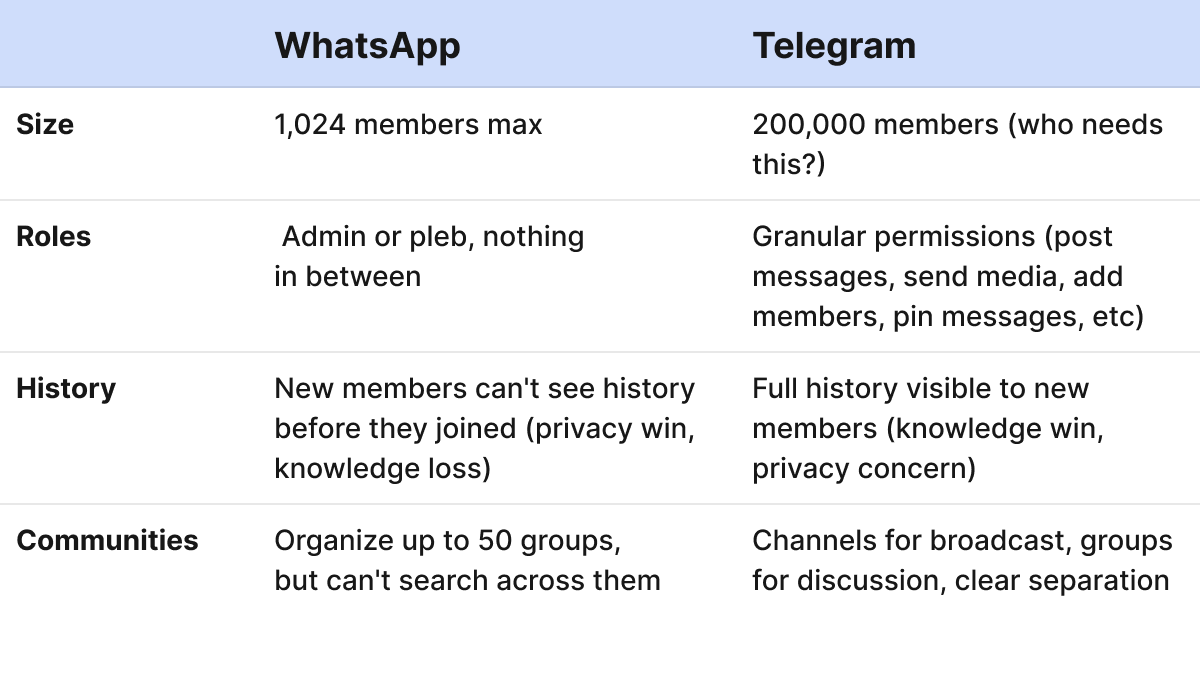
For external comms and business communities, this isn't even a competition. Telegram demolishes WhatsApp. Channel subscribers? Unlimited. Broadcast messages? Actual analytics. Bots that can handle payments, polls, and automation? Standard. Telegram clearly wins for scale and control here; WhatsApp can only be praised for privacy defaults.
Notifications: The Art of Not Going Insane
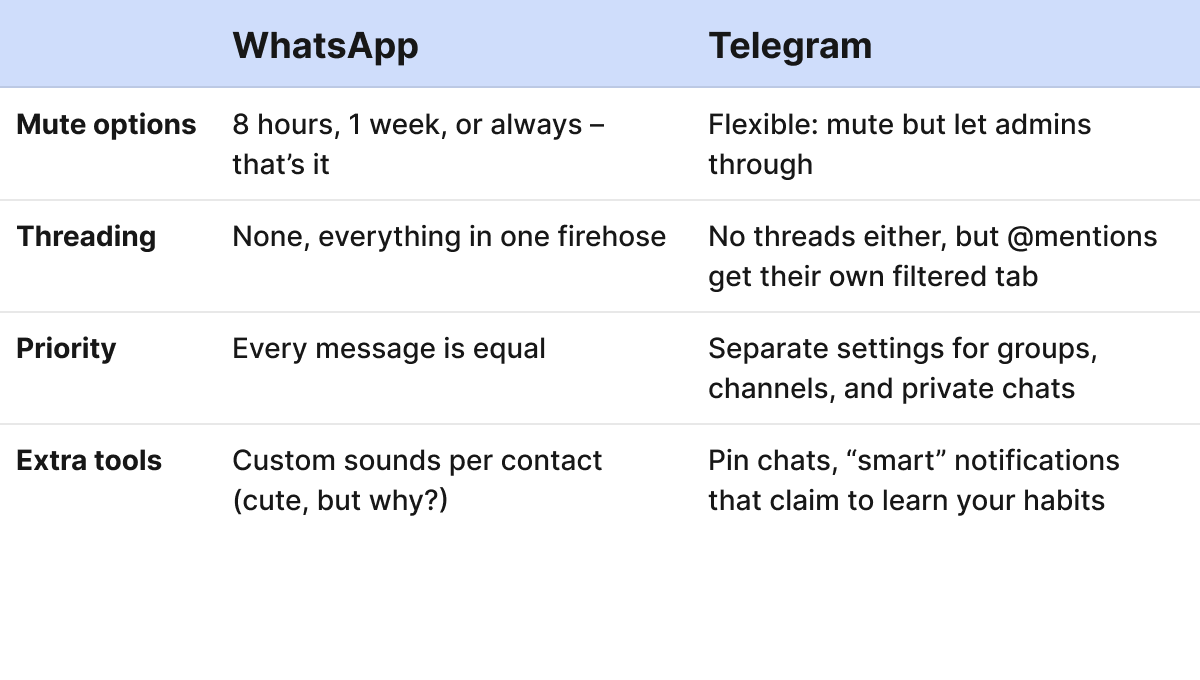
Telegram offers more knobs and filters, but neither app truly solves notification overload. You still get more noise than signal. Neither WhatsApp nor Telegram passes the ultimate test: “Show me only what actually needs my response right now.” Your sanity is still on its own.
Storage & Archives: Your Future Self Will Thank You — or Curse You
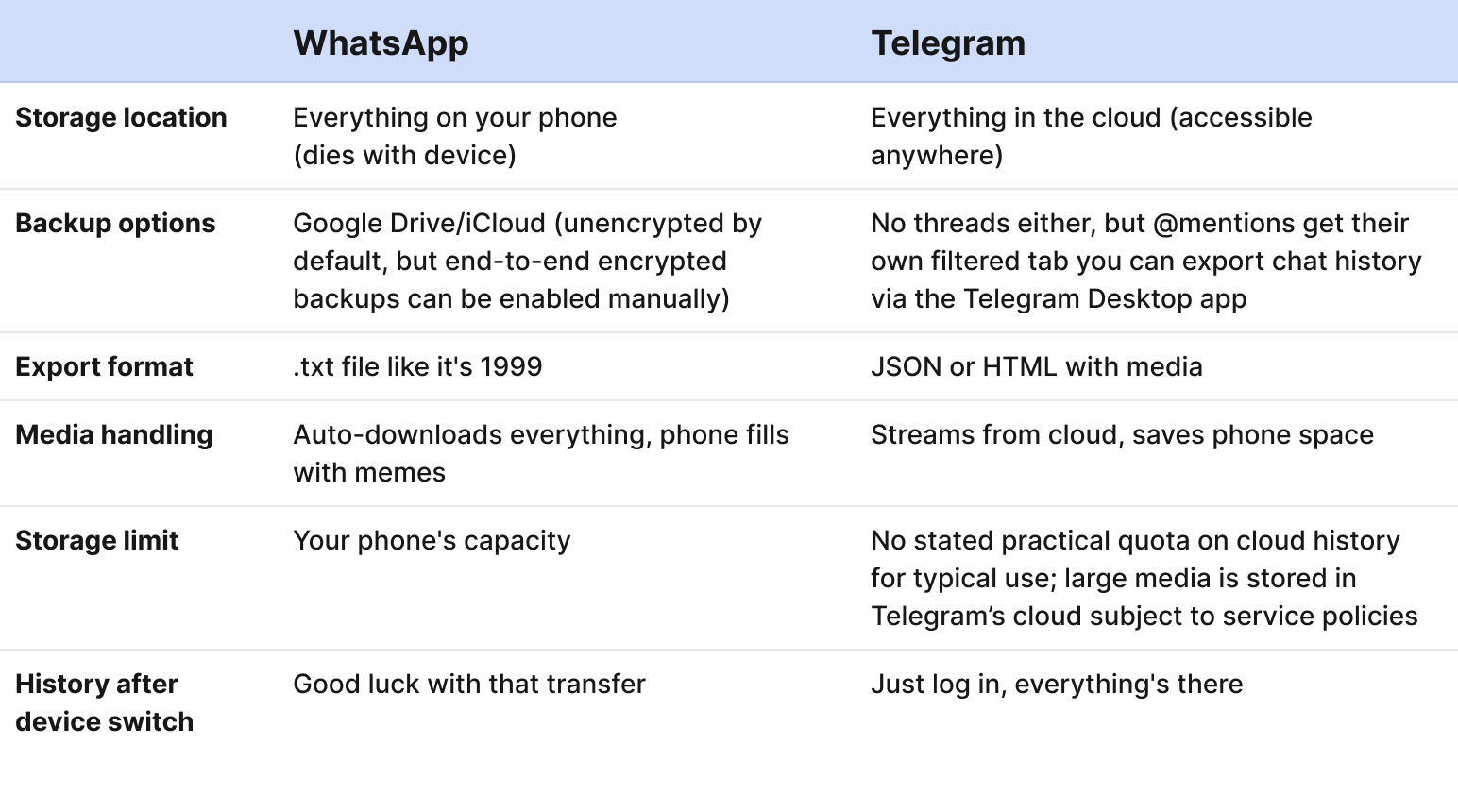
Winner: Telegram wins for convenience — unless you’re paranoid about cloud storage. And if you do want a local copy, beware: the export feature works only in certain desktop versions. Some have it, some don’t. What a mess.
Integrations & API: Where Dreams Go to Die
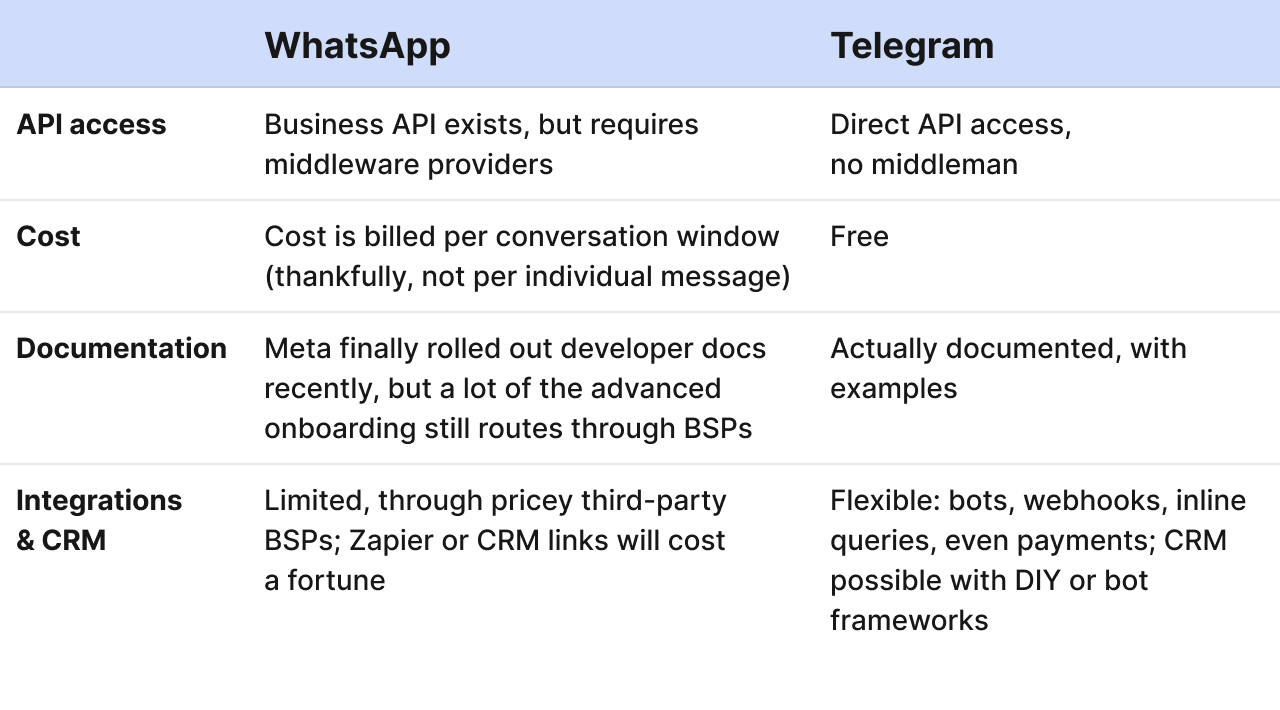
Telegram gives developers real freedom, but it demands time and code. WhatsApp, meanwhile, makes you pull out the enterprise checkbook.
Compliance & Control: The Boring Stuff That Gets You Fired
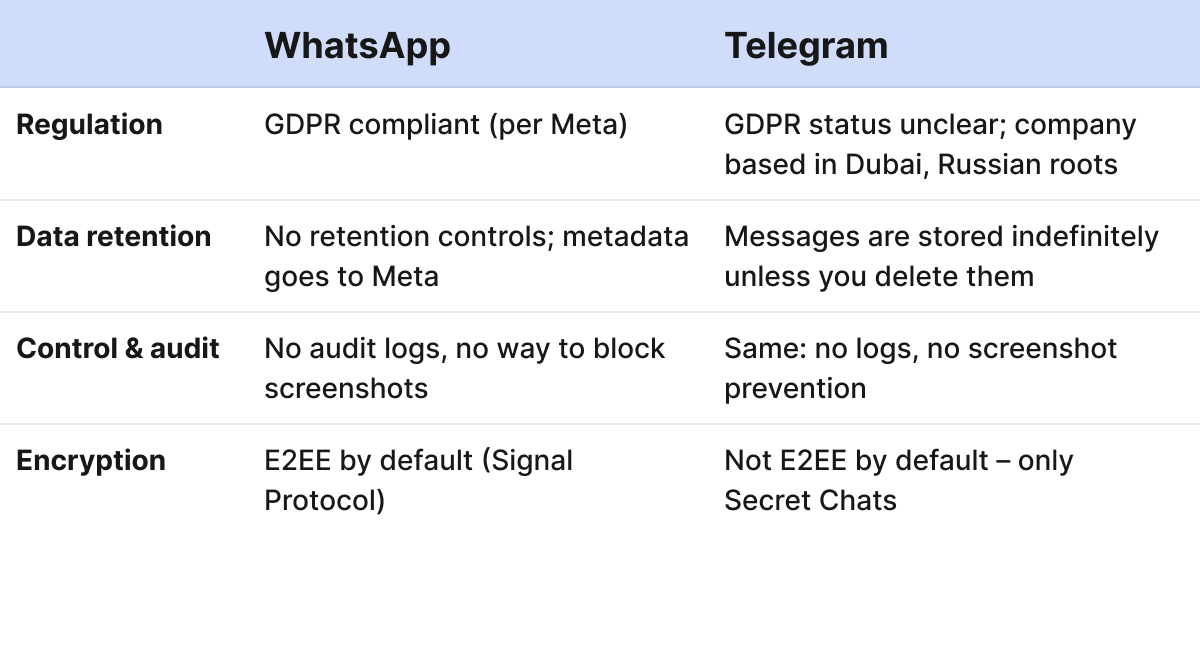
Both platforms are compliance nightmares. Your legal team won’t love either one. In practice, you’ll need third-party compliance layers just to stay safe. If you truly need self-hosted control and branching task threads, look at Bridge or Mattermost. If you only want a secure messenger with strict privacy rules, then Signal or Matrix will fit better.
Wait — Who Are They All? Alternatives Worth Considering
Well, yes, suddenly other players burst onto the court.
Bridge.
Imagine Slack, Notion, and Jira stitched together — but with AI agents built into the fabric. That’s Bridge. A workspace where humans and AI collaborate side by side. (Try it out here). It keeps context fresh across chats, and tasks, docs, and databases so agents can act on real-time data along with knowledge bases. It can be fully on-premise as well, ensuring full data ownership with no reliance on someone else’s cloud.
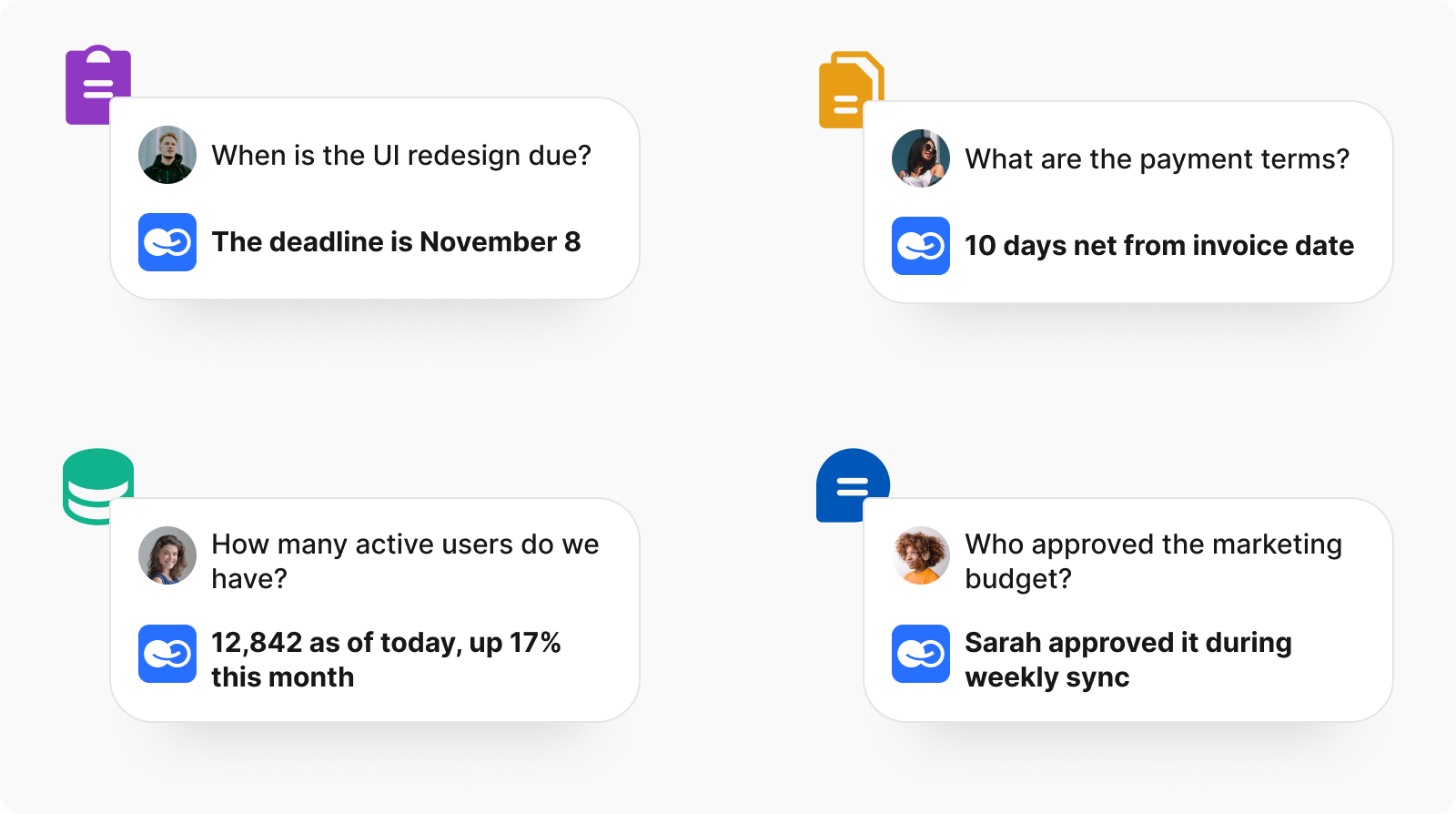
Mattermost.
Think of it as Slack’s serious cousin who works in defense or finance. Mattermost is open-source, on-premise by design, and already trusted by the U.S. Department of Defense and other regulated industries. It looks and feels like a modern team chat, but its real strength is control: compliance features and granular audit logs. Where WhatsApp and Telegram give you emojis, Mattermost gives you chain of custody. But it also requires IT muscle to deploy and maintain it.
Signal.
It’s open source. Its Signal Protocol underpins WhatsApp, Facebook Messenger, and more. While many services collect and monetize metadata, Signal itself only stores the date you created your account. And for what it’s worth, Signal is now also “post-quantum” — they use a hybrid encryption scheme (PQXDH) that should protect your chats even if governments harvest them today and quantum computers decrypt them tomorrow.
Matrix.
Matrix is an open standard for decentralized communication, with servers you can run yourself. Governments like France have adopted Matrix for secure internal comms. But here’s the catch: while Matrix gives you freedom and federation, it also gives you headaches — server maintenance, upgrades, bridging to legacy messengers. It’s powerful, but only if you have the sysadmins to tame it.
What Teams Actually Need (And Neither Provides)
When it comes to real work, both WhatsApp and Telegram stumble on the basics. Take code and technical docs: in WhatsApp, pasting code looks like a drunk spider walked across your screen. Telegram does a bit better with Markdown, but there’s no syntax highlighting, no way to review code, no inline comments, and definitely no version tracking.
Adding new members or onboarding new employees? Equally painful. WhatsApp group greets newcomers with a total absence of previous chat history. New Telegram group members can see full message history (though admins can restrict this with ‘New members won't see earlier messages’). Neither offers proper onboarding guides, scalable pinned resources, or bots that can serve as a living FAQ.
Any dashboards for productivity? Forget it. WhatsApp’s idea of a metric is “John was last seen at 3 AM.” Telegram proudly reports 45,892 new messages. Neither tells you anything useful about response times, decision-making speed, or blockers.
But… Any successful business will at some point leverage WhatsApp or Telegram (or both) for customer service and direct sales. Then — resort to Telegram for community building, content marketing, and automated workflows. Or to WhatsApp for providing customer support for a mass product.
The Verdict Nobody Wants to Hear
For internal team communication, both WhatsApp and Telegram are wrong choices. Even if they're wearing business costumes in their marketing. They're consumer apps playing dress-up indeed. No threading, mediocre search, zero native integrations, no proper permission systems.
If you're serious about building a scalable knowledge base, skip both. Bite the bullet and get Bridge, the most innovative way for teams to connect, collaborate, and communicate.
The real question isn’t ‘WhatsApp or Telegram?’ It’s ‘How much pain will we endure before admitting we need smart team collaboration tools?’.

